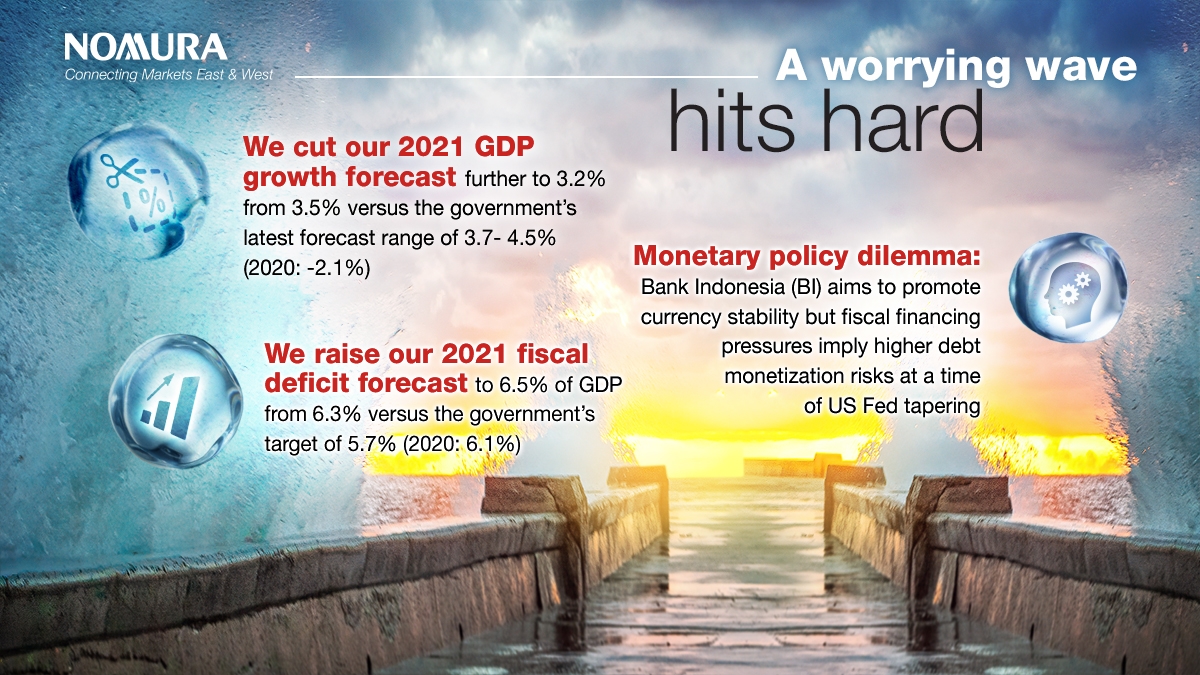Due to the resurgence of Covid-19 cases in Indonesia, the government introduced measures (emergency PPKM) in early July that are more stringent than the mobility restrictions in place since last year. We expect the PPKM measures to be in place for 1-2 months, with only a very gradual reopening thereafter. The quick-spreading delta variant of the virus, the delay in implementing the PPKM, and the slow pace of vaccination with only 11.6% of the population inoculated by late July, point to an outbreak that is becoming increasingly difficult to contain.
Due to this severe second wave in Indonesia, we have reduced our 2021 GDP growth forecast for the economy from 3.5% to 3.2%. That implies economic output will not return to pre-pandemic levels until the fourth quarter of 2021, delayed from our previous third quarter estimate. The key sectors posing a drag on headline GDP growth are retail trade, accommodation and food, as malls are closed and travel restrictions remain in place.
Unfortunately, Indonesia’s death rate per million of population has exceeded neighboring Malaysia’s, and is significantly higher than India’s at the worst point in its latest wave. With the rising death toll, the public fear factor will also weigh heavily on consumer sentiment for a prolonged period.
We have also raised our 2021 fiscal deficit forecast to 6.5% of GDP from 6.3%, above the Ministry of Finance’s budget of 5.7%. The budget will be the government’s main tool for providing support measures to vulnerable sectors and helping the broader economy, requiring higher fiscal spending on top of already existing measures such as cash transfers to millions of households.
A wider fiscal deficit will likely be funded by more bond issuance in the second half of 2021 and require support from Bank Indonesia (BI). BI is expected to leave its policy rate unchanged this year due to its priority of maintaining FX stability, but fiscal financing pressures create a policy dilemma for BI amid US Fed tapering prospects.
For more on our forecasts for the Indonesian economy, read our full report.
Disclaimer
This content has been prepared by Nomura solely for information purposes, and is not an offer to buy or sell or provide (as the case may be) or a solicitation of an offer to buy or sell or enter into any agreement with respect to any security, product, service (including but not limited to investment advisory services) or investment. The opinions expressed in the content do not constitute investment advice and independent advice should be sought where appropriate.The content contains general information only and does not take into account the individual objectives, financial situation or needs of a person. All information, opinions and estimates expressed in the content are current as of the date of publication, are subject to change without notice, and may become outdated over time. To the extent that any materials or investment services on or referred to in the content are construed to be regulated activities under the local laws of any jurisdiction and are made available to persons resident in such jurisdiction, they shall only be made available through appropriately licenced Nomura entities in that jurisdiction or otherwise through Nomura entities that are exempt from applicable licensing and regulatory requirements in that jurisdiction. For more information please go to https://www.nomuraholdings.com/policy/terms.html.







